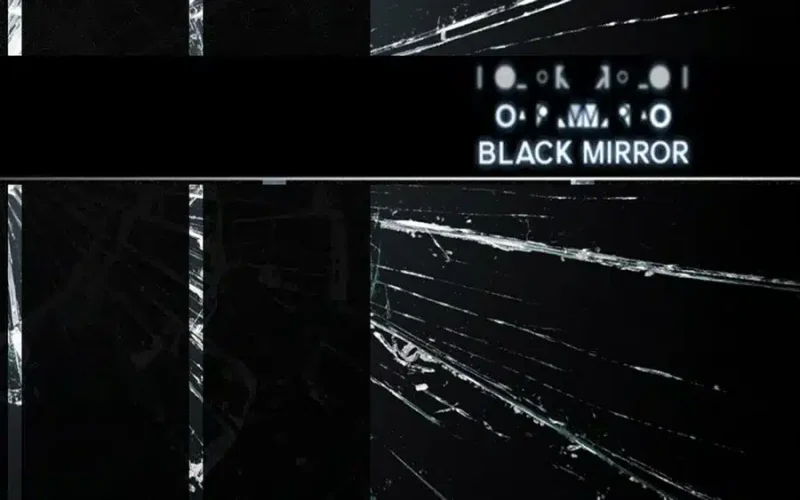Black Mirror Season 7 has dropped, and once again, our faith in technology is hanging by a glitching thread. Season 7 gave us six uniquely disturbing, surprisingly tender, and sometimes gut-punching stories about the increasingly blurred line between what is real and what has been programmed. But not all digital horrors are created equal. Some episodes hit harder, linger longer, and make you stare into your phone with fresh unease. Here is a ranking of all six episodes of Black Mirror Season 7 from best to worst, not based on spectacle but on emotional impact, relevance, and the kind of quiet terror Black Mirror does best.
Black Mirror Season 7: Episodes Best to Worst
1) Black Mirror Season 7 – Eulogy (Paul Giamatti, Patsy Ferran)
There is something hauntingly beautiful about Eulogy. The episode tells the story of a man who obsessively relives old memories through a photo-based tech interface, desperate to rewrite his past. Paul Giamatti delivers a raw, deeply human performance that anchors the episode’s emotional weight. It is a meditation on grief, guilt, and our growing dependence on curated memory. Unlike more tech-forward episodes, Eulogy goes inward, and it hits hardest because of it. Its message is simple: sometimes, the most dangerous code is nostalgia. Poignant, sad, and unforgettable.
2) Black Mirror Season 7 – Hotel Reverie (Issa Rae, Emma Corrin, Awkwafina, Harriet Walter)
This one is a strange blend of romance, dread, and Hollywood flair. Set in a fully immersive VR experience modeled after a 1940s film, Hotel Reverie follows Brandy (Issa Rae) as she develops feelings for a scripted character. The AI does not play by the rules, and neither does her heart. The episode is stylish and unsettling but never loses its emotional thread. It questions authenticity in love and art and whether feelings are real if they are coded. Issa Rae is magnetic, and the world-building is both dreamy and unnerving. Easily the most imaginative of the season.
3) Black Mirror Season 7 – Common People (Rashida Jones, Chris O’Dowd, Tracee Ellis Ross)
A woman’s life hangs in the balance, and her husband signs her up for a technology that offers survival at a cost. Common People is heavy on moral ambiguity. Would you keep someone alive at the expense of their autonomy? Rashida Jones brings vulnerability to Amanda’s terrifying new reality, and Chris O’Dowd plays the role of a desperate husband with nuance. It is not a loud episode, but it simmers with dread. By the end, you are left questioning what mercy really looks like in the digital age. It does not reinvent the genre, but it earns its place with quiet devastation.
4) Black Mirror Season 7 – USS Callister: Into Infinity (Milanka Brooks, Billy Magnussen, Jimmi Simpson, Osy Ikhile, Paul G. Raymond, Cristin Milioti)
This sequel had a lot to live up to. Although it does not quite match the original, it expands the story in a satisfying way. Daly’s digital clone escapes his original prison and becomes a new kind of villain in an evolved virtual world. There is more action, more spectacle, and a lot more philosophical questions about agency in code. While it is not the most emotionally resonant episode of the season, it is definitely the most fun. Longtime fans will appreciate the callbacks, and Plemons is, once again, a scene-stealer in all his pixelated terror.
5) Black Mirror Sean 7 – Bete Noire (Siena Kelly, Rosy McEwen, Michael Workeye, Ben Bailey Smith, Amber Grappy, Ravi Aujla, Elena Sanz, Hannah Griffiths)
Visually intense and psychologically twisty, Bete Noire focuses on memory manipulation and the thirst for revenge. The premise is solid. What if you could rewrite what people remember about you? But despite the cool concept, the pacing drags, and the character motivations feel undercooked. Still, it delivers on paranoia and offers a sobering look at how digital identity can be weaponized. It is the kind of episode that creeps up on you later, even if it does not leave an immediate mark. A worthwhile entry, just not the most memorable in a strong season.
6) Blak Mirror Season 7 – Plaything (Peter Capaldi, Lewis Gribbin, James Nelson, Michele Austin, Will Poulter, Asim Chaudhry)
This retro-infused mystery feels like them trying something new but not quite landing it in Black Mirror Season 7. It centres on a man who rediscovers an old console that seems to control more than just pixels. While the aesthetic is cool and the mystery unfolds in a fun way, the emotional stakes never quite register. It is a love letter to old-school gaming, but the tech paranoia does not go deep enough. The message gets muddled, and the final twist feels more gimmick than gut punch. It is entertaining, just not profound, which, for Black Mirror, feels like a missed opportunity.
Conclusion
Black Mirror Season 7 did not hold back. Even at its weakest, it still sparked questions we will be chewing on long after the credits roll. From soul-searching in pixelated hotel suites to the ghostly echoes of last moments trapped in tech, this season reminded us that the scariest part of the future might be how much of ourselves we are willing to upload. Whether you were left heartbroken, horrified, or somewhere in between, this batch of episodes proves Black Mirror has not lost its edge. If anything, it is digging deeper and looking right back at us.







